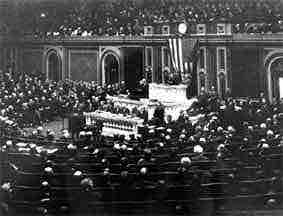The Progressive Era in the United States, from the 1890s to the 1920s, was a time of social activism and political reform in response to vast modernization. Morality, liberal democracy and self-determination fueled Progressivism and its goals of eliminating government corruption and increasing efficiency and expertise in areas such as education and social justice.
While many historians disagree over the exact dates of the Progressive Era, most see World War I as a globalized expression of the American movement, with Wilson's fight for the League of Nations envisioned in his Fourteen Points as its climax.
Progressivism and Entry into War
At the outset of World War I, Europe was ruled by a long standing system of power brokering called the Concert of Europe, in which the most powerful nations ruled by a small number of empires and monarchs guided the fate of the continent through a shifting system of alliances and treaties, some of which remained secret until they were needed. This came to a bloody climax when these alliances provoked the start of World War I by drawing all the great nations of the continent into conflict with each other.
Initially, liberal Progressives in America were opposed to U.S. involvement in the conflict due to their belief that warfare always had an immoral, hidden economic motivation. Antiwar activists warned of New York bankers, profiteering munition makers, and industrialists searching for global markets to control through American involvement in the war.
Yet Progressives eventually came to believe that, in contrast to the great powers of the Concert of Europe, America possessed a superior moral position as the only great nation devoted to the principles of freedom, democracy and self-determination, and that those ideals could be achieved in a just war. The most important proponent of this concept was President Woodrow Wilson, who in 1917 won the support of a large number of these moralists by framing World War I as "a war to make the world safe for democracy" and the time to fight for Progressive ideals.
Woodrow Wilson
Woodrow Wilson, one of the most prominent Progressives, framed World War I in moral and democratic terms.
Americanization and Efficiency
During the war, Progressives strongly promoted Americanization programs designed to modernize recent immigrants and turn them into model Americans with diminishing loyalties to the “old country.” These programs often operated through the public school system, which expanded dramatically.
Although the U.S. entered the war in 1917, three years into the fighting, there had been very little planning or even recognition of the problems the European Allies faced in maintaining the capacity to wage war. There was a high level of confusion regarding the needs of a wartime nation in the first 12 months of America’s involvement, but then efficiency took root in a systematic mobilization of the entire population and economy that produced the soldiers, food supplies, munitions, and money needed to win the war.
The Progressive Movement was well suited to this effort, as many of its core values involved efficiency in all areas of society. Reflecting the highly valued expertise necessary to generate ideas that motivated citizens and redirected the economy into a state of high production, the federal government set up a multitude of temporary agencies employing 500,000 to 1 million new workers.
Wilson's Fourteen Points
The Fourteen Points was a speech given by Wilson to a joint session of Congress on January 8, 1918. The address was intended to assure Americans that the Great War was being fought for moral causes, including post-war peace in Europe. Delivered 10 months before the armistice with Germany, the speech became the basis for the terms of the German surrender as negotiated at the Paris Peace Conference in 1919.

The Fourteen Points Speech
Woodrow Wilson's speech in Congress, January 8, 1918.
Wilson's speech translated many of the principles of Progressivism that had produced domestic reform in the U.S. into foreign policy encompassing free trade, open agreements, democracy, and self-determination, which was the ideal of nations determining their own futures without outside political or military interference. The speech was the only explicit statement of aims by any of the nations involved in World War I and led to Wilson receiving the 1919 Nobel Peace Prize for his efforts to create a peaceful global community.